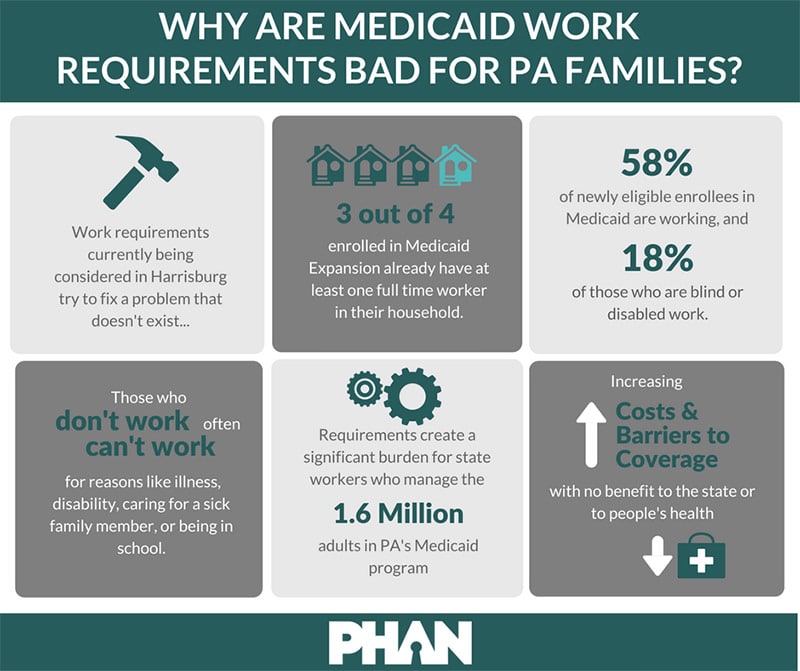 Officials in Harrisburg and D.C. are pushing to expand work requirements for food and medical public assistance programs. These requirements come with harsh time limits on aid for those who can’t meet them.
Officials in Harrisburg and D.C. are pushing to expand work requirements for food and medical public assistance programs. These requirements come with harsh time limits on aid for those who can’t meet them.
Current rules:
The Supplemental Nutrition Assistance Program (SNAP or “food stamps”) has had work requirements for childless able-bodied recipients age 18-49 since 1996. Recipients must meet the work requirement of 20 hours/week of employment or training, or 26 hours a month of community service. Otherwise they can only receive food stamps for three months out of three years.
Under federal rules, federal or state governments can waive these requirements during periods or in places of high unemployment, as they were during the recent recession. Federal SNAP work requirement rules also exempt older adults, people with disabilities or a medical condition, and single parents.
Medicaid has no work requirement.
Future rules?
Republican leaders are trying to toughen the rules on assistance programs in order to restrict eligibility. Cutting funding for these programs outright would be incredibly unpopular. So officials are trying to shrink them by making them harder to access.
In Pennsylvania, expanding work requirements for SNAP and putting them in place for Medicaid would pose an immediate danger to tens of thousands of people. These include low-wage and part-time workers who can’t find steady employment, veterans, people who are displaced (“homeless”), and people struggling with addictions. The additional bureaucratic red-tape would make it harder for all vulnerable Pennsylvanians to access food and health care – including children, seniors, and people with disabilities.
These rules are cruel, wasteful, and entirely wrong-headed:
Work requirements address a non-issue. Most non-disabled adults who receive assistance are already working or are between jobs.
Work requirements are expensive. Requiring more rules and complicated processes for basic assistance programs will cost more than it will save. Monitoring work hours and job training attendance for tens of thousands of low-income Pennsylvanians is an unnecessary administrative burden that taxpayers should not have to shoulder. And for every person in need whom the government denies help, the costs to our society, our economy, and our communities will rise as hunger, sickness, and poverty grow.
Work requirements can hurt people who are working. Workers can get tripped up by work requirements – either because of paperwork requirements or when fluctuating schedules don’t meet the weekly requirement.
Work requirements can hurt people who are meant to be exempt, including people with disabilities or other serious health conditions. They may not know about their exemption, or be unable to gather the paperwork to verify their condition. In the end, they would lose their assistance, making it even harder for them to maintain their health and independence.
Work requirements can trap people in poverty, not lift them out. If someone loses their job because their health deteriorates, they also lose medical coverage and access to treatment. When employers cut workers’ hours and money for food is tight, they lose their food assistance. Having medical and food assistance helps to stabilize families’ situations, overcome crises, and make it easier to seek and keep a job.
Work requirements just don’t work. Work requirements have been in place since 1996 for Temporary Assistance for Needy Families (TANF) and they have yielded little to no long-term positive effect on employment or earnings. But many families in poverty lost basic assistance because they couldn’t meet them. These policies just put more families at risk.
All of which begs the question: why are Republican officials supporting this policy? Simple: Because “welfare reform” helps cast doubt on the efficacy of these program and fosters disdain for the people who have to rely on them. That means elected officials can spend more money on tax cuts for the rich – themselves and their donors – instead.
Their interest in work requirements is entirely self-serving, despite their claims otherwise.
Take Action
Sorry, there are currently no related posts. Check back soon for more!
More Resources
MEMO: It’s Not Really About Work — Why Pennsylvania Should Reject Work Requirements – Pennsylvania Budget and Policy Center
Work Requirement Proposals Would Kick Struggling Workers When They’re Down – Center for American Progress
SNAP Reports Present Misleading Findings on Impact of Three-Month Time Limit – Center on Budget and Policy Priorities




